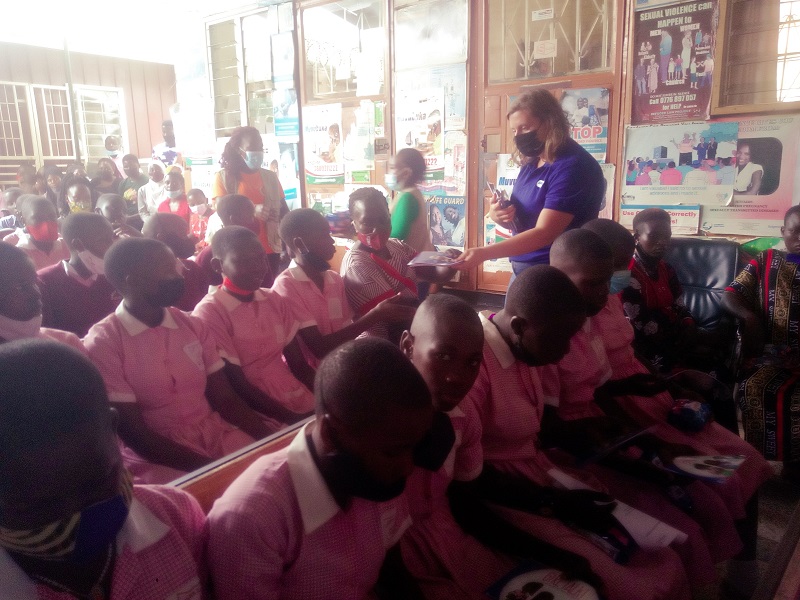
KAMPALA – In the commemoration of International Women’s Day 2022, AFRIpads has given back to the community by donating menstrual kits to 100 less privileged teenage mothers and schoolgirls in Naguru Teenage Health and Information Centre in Kampala.
In partnership with the Naguru Teenage Health and Information Centre in Kiswa in Bugolobi, the AFRIpads Foundation, the charitable arm of AFRIpads, donated 100 schoolgirl Kits and Underwear worth over UGX 2,800,000, which will last the beneficiaries 12 months.
Handing over the assortment to the beneficiaries at Naguru Teenage Health and Information Centre in Kiswa in Bugolobi on Wednesday, Ms. Gertrude Emojong, National Marketing and Communications Lead, at AFRIpads, said the gesture is in line with the 2022 International Women’s Day of “Gender equality today for a sustainable tomorrow”.
“To celebrate International Women Day’s 2022 theme of: “gender equality today for a sustainable tomorrow”, we decided to give back to the community of teenagers and young mothers at Naguru Teenage Information and Centre (NTIHC). We believe that empowering teenage mothers is an important task, particularly in light of the alarming increase of teenage pregnancies in relation to COVID-19. We have partnered with the Naguru Teenage Information and Health Centre to provide a long-lasting menstrual
health and hygiene solution to 100 teenage girls.”

“The AFRIpads Schoolgirl kit has been developed through user-centered design in collaboration with school-aged girls, with the aim of creating a set of reusable pads that best meet the needs and preferences of this age group. We are passionate in enabling girls to overcome menstrual barriers so they can achieve their full potential.”
Ms Emojong told the press that “The AFRIpads Foundation, the charitable arm, of AFRIpads is more than happy to help teenage mothers and girls with menstrual supplies.” She revealed that they chose to partner with Naguru Teenage Health and Information Centre because their (AFRIpads) headquarters are based in Naguru.
“So this is one way of giving back to the community where our headquarters are based. We are very grateful to be AFRIpads Foundation that has made this donation today possible.”
She revealed that in their over eleven years of existence, they have reached over 3.5 million girls and women across the globe with their services, mainly AFRIpads, saying that AFRIpads can last over twelve months based on proper use and care of the beneficiary.

Ms. Emojong has challenged parents, teachers, guardians and everyone to normalise the conversation about menstruation, saying that the more they talk about it, the more they break the biases that surround menstruation that lead young girls to resort to unsafe practices.
Mr. Sam Asiimwe, Program Manager at Naguru Teenage Health and Information Centre in Kiswa, Bugolobi said that on average, they receive fifty young girls per day at their facility with teenage pregnancy situation something he attributes to the redundancy the young girls are going through coupled with financial stress that families are experiencing in terms of ensuring that the young people get the basics at home.
He said that according to research, one in ten young girls doesn’t attend school when they are undergoing menstruation because of the pain associated with it and lack of access to pads.

“Averagely, you will realize that in a year, a young girl has lost about 20% of school time. That has a lot of implications because most of those that lose time without going back to school fall back within the school system, they are not catching up as much as their colleagues and a big percentage of them will drop out of school… get pregnant very early,” he said, adding that, “It is critical if partners like AFRIpads come into these spaces and we work together and ensure that vulnerable young girls can access menstrual materials and information on how to maintain menstrual hygiene.”
“Previously we used to see teenage pregnancies at a rate of about 25%, meaning one in four girls would get pregnant in their teens, now that percentage has gone about 35%,” he said.
Naguru Teenage Health and Information Centre operates in 32 government units in nine districts in Central Uganda.
A 20-year old Carolyn, a senior three dropout at Bishop Ogez Highschool in Bushenyi narrated that she got pregnant when she came to look for a job in Kampala during the Covid-19 school closure.
“I came to Kampala to look for a job because I didn’t want to stay at home. So time reached and I couldn’t afford rent before I got a guy who happens to be a driver in Kitintare who started renting for me. So I started staying with him.”
Carolyn said it is normally had for a young girl to do without sanitary pads which makes a good number of them run out of school since they feel ashamed.

AFRIpads has been a pioneer of Menstrual Health and Hygiene (MHH) in Uganda since the organization’s inception in 2010. It has grown beyond locally manufacturing reusable sanitary pads in Masaka, Uganda to providing a complete MHH solution that includes products, an MHH Education Toolkit, and a comprehensive Data Collection Toolkit. To date, they have reached over 3.5 million women and girls and employ over 150 women in its factory in Masaka.
AFRIpads is a social business that specializes in the local manufacture and global supply of high-quality, reusable sanitary pads. As the leading manufacturer and supplier of reusable sanitary pads on the continent, AFRIpads proudly manufactures 100% of its products in Uganda.




